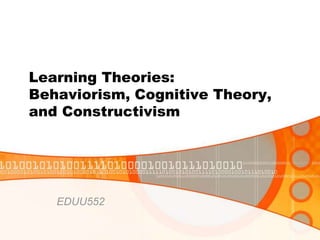
Learning theories
- 1. Learning Theories:Behaviorism, Cognitive Theory, and Constructivism EDUU552
- 2. Instruction Primary physical means of instruction prior to the 20th Century The teacher The chalkboard The textbook Influence of technology the use of media for instructional purposes the use of systematic instructional design procedures or instructional design
- 3. World War II Psychologists and Educators Conducted experimental research Developed training materials for the military Influenced the types of training materials that were developed Based on their work on instructional principles Examined research and theory on instruction, learning, and human behavior
- 4. Programmed Instruction Established after WWII Started seeing training as a system Developed a number of innovative analysis, design, and evaluation procedures Programmed instruction movement (mid-1950s through the mid-1960s) Major factor in the development of the systems approach.
- 5. B.F. Skinner Wrote article called: The Science of Learning and the Art of Teaching (1954) Believed that increasing human learning could increase if instructional materials were effectively designed. Programmed instructional materials should: present instruction in small steps require overt responses to frequent questions provide immediate feedback allow for learner self-pacing Learner would receive positive reinforcement with the feedback they received TIP Theories – Operant Conditioning More on Skinner
- 6. Programmed Instruction Data regarding the effectiveness of the materials were collected Instructional weaknesses were identified Materials were revised accordingly Trial and revision procedure provided formative evaluation Still found in current instructional design models. B.F. Skinner’s Teaching Machine for Programmed Instruction More on Programmed Instruction
- 7. Positivism and Objectivism Knowledge exists as absolute truth Transfer knowledge from outside to inside the learner Arrange conditions to promote specific goals Teacher directed, learner receiving Goals predetermined Objectives defined Activities, materials, assessment is teacher driven Hand in products for teacher assessment
- 8. Cognitive Development Theories Educational research theories beyond behaviorism consider cognitive development Changes in cognitive skills are related to intellectual growth and age Child’s behavior not just result of external stimuli – but also internal stimuli Individual differences in children should be recognized and addressed
- 9. Jean Piaget Three Types of Knowledge Physical, Social, Logical Developmental Concept Learning Assimilation – what makes sense in child’s environment Accommodation – new in context with known Adaptation – adjusts to the environment and learns the consequences of specific actions Organization – integrates schemata and develop more complex logic
- 10. Stages of Cognitive Development Sensorimotor Stage - Birth to two Objects exist outside of their visual field - object permanence Learn strictly through sensory experience within their environment - KINESTHETIC Pre-operational Stage - Ages 2 - 7 Period of Language Development Egocentrism - only see self perceptions Categorize by single obvious feature
- 11. Piaget Stage Theory Concrete Operational Stage - Ages 7 - 12 Develop ability to handle complex logic and make comparisons Hypothesize and reason ONLY about things they’ve experienced themselves Formal Operational Stage - Age 12 - Adult Abstract thinking ability Offer interpretations and draw conclusions Formulate hypotheses
- 12. Child processes information and builds increasingly complex models of the world Motivation based on intrinsic value, curiosity, and cooperation/reciprocity The way problems are structured must address a child’s intellectual development and maturation Three modes of how things are represented: Enactive - touch, feel, manipulate objects Iconic - images that stand for perceptual events Symbolic representation – language and ideas J. L. Bruner – Cognitive Theory
- 13. Socio-Cultural Theory Lev Vygotsky - 1896-1934 Perspective/Values – Foster group and individual identity Children construct their own knowledge through interaction with others Teacher scaffolds learning fundamental competencies that shape their minds for further learning: Cognitive Linguistic Social-emotional Lifelong process of development dependent on social interaction with adults and peers
- 14. Zone of Proximal Development ZPD - The difference between what a learner can do without help and what he or she can do with help (Vygotsky) Child’s Current Achievement ZPD Beyond reach beyond this point
- 15. Constructivism 1990s - Constructivist theory of learning and instruction The instructional principles require learners to: solve complex and realistic problems work together to solve those problems examine the problems from multiple perspectives take ownership of the learning process (rather than being passive recipients of instruction) become aware of their own role in the knowledge construction process “Authentic learning tasks that reflect the complexity of the real-world environment in which learners will be using the skills they are learning”
- 17. Relativism and Constructivism Knowledge is constructed by learner Truth is contextual Teacher guides learner to construct knowledge Teacher provides rich context Learner centered environment Teacher facilitates, learner controls
- 18. Relativism and Constructivism Learning goals negotiated and problems are contextual and authentic Activities, materials, assessment is context driven and individually constructed Artifacts share and reflected on, collectively and individually
- 19. Constructivism in the Classroom Students construct new ideas by incorporating new material into the concepts and thought processes already in place. Allow student thinking to drive lessons Ask thoughtful, open-ended questions Encourage metacognition - thinking about how they are learning Encourage students to interact with each other and YOU Cooperate and Collaborate. Reflect and Predict!
- 20. Four Step Process to Teaching Teacher presents an invitation to learn - CAPTURE ATTENTION! Teacher gives students opportunity to explore, discover, and create Students propose explanations and solutions Students take action on what they have learned.
